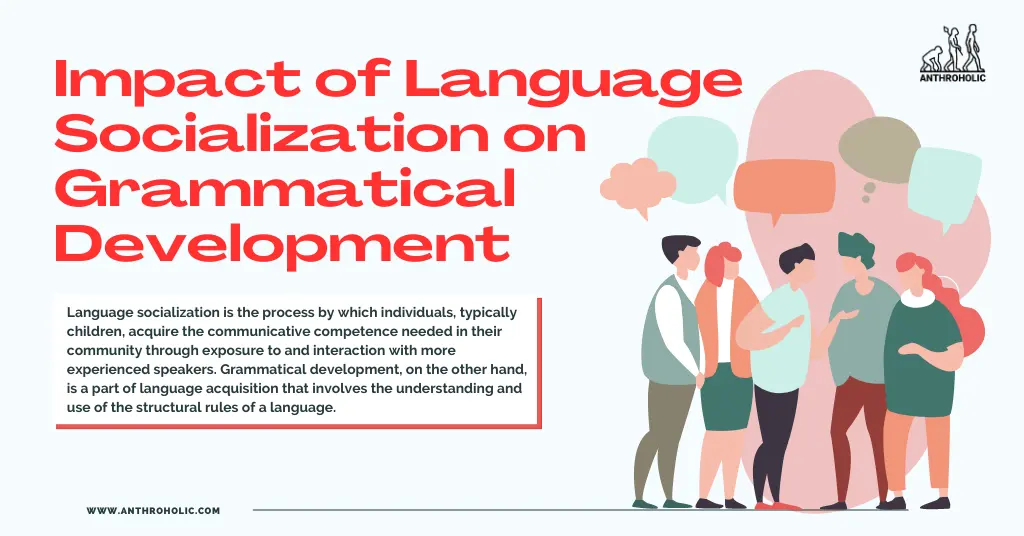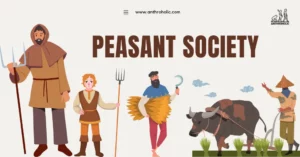AI Answer Evaluation Platform Live Now. Try Free Answer Evaluation Now
Impact of Language Socialization on Grammatical Development
Language socialization is the process by which individuals, typically children, acquire the communicative competence needed in their community through exposure to and interaction with more experienced speakers [1]. Grammatical development, on the other hand, is a part of language acquisition that involves the understanding and use of the structural rules of a language.

Language Socialization: A Brief Overview
Language socialization asserts that language learning is both a cognitive process and a social one. It posits that our language use, including the development of grammatical knowledge, is heavily influenced by our interactions within a given culture [2].
Language Socialization and Grammatical Development
Language Input
Language input, or the language a learner is exposed to, plays a significant role in shaping grammatical development. This input typically comes from adult speakers in the child’s environment, and the nature and quality of this input can greatly influence a child’s linguistic development [3].
Interactional Context
The interactive settings in which language use occurs are equally vital. Children acquire the structural features of their language not only through input but also through active participation in these interactive contexts. Examples include family conversations, playtime with peers, and educational settings [4].
Socialization Agents
Socialization agents like parents, teachers, and peers contribute to grammatical development. They serve as language models, provide feedback, and create opportunities for practice, all of which contribute to grammatical competence [5].
Anthropological Evidence of Language Socialization’s Impact on Grammatical Development
Anthropological studies have provided empirical evidence showing the impact of language socialization on grammatical development.
Table 1 presents a summary of these anthropological studies.
| Study | Findings |
|---|---|
| Ochs and Schieffelin, 1984 [6] | Identified the importance of the cultural context in shaping language acquisition. Found that in some cultures, children’s grammatical errors were not corrected, while in others, correction was routine. |
| Heath, 1983 [7] | Demonstrated that variations in the language environment (e.g., the types of questions asked by parents) led to different grammatical development patterns in children. |
The Interplay between Language Socialization and Grammatical Development
Language socialization and grammatical development are not independent processes but are closely intertwined. Here’s how they interact:
- Social interactions provide a platform for learning and using grammar rules.
- Socialization practices often involve grammatical instruction, either explicit or implicit.
- Grammatical development facilitates socialization by enabling more complex communication.
Impact of Cultural Practices on Grammatical Development
While the influence of language socialization on grammatical development is universally accepted, the nuances of how culture-specific practices impact grammatical development is an area of study that warrants further exploration. The anthropological lens can help shed light on this by considering linguistic variations across different cultures.
Ritualistic Language Use
Certain cultural rituals often involve stylized and repetitive language use, which can aid in grammatical development. These ritualistic practices often introduce children to more complex linguistic structures and provide an opportunity to practice them.
Storytelling and Folktales
Cultures rich in storytelling and oral traditions provide children with complex narrative structures that can significantly influence grammatical development. The cultural practice of narrating folktales, for example, exposes children to language structures not typically used in daily conversation, enhancing their grammatical competence.
Table 2 presents an overview of the impact of cultural practices on grammatical development.
| Cultural Practices | Impact on Grammatical Development |
|---|---|
| Ritualistic Language Use | Introduces children to complex linguistic structures |
| Storytelling and Folktales | Exposes children to unique narrative structures enhancing their grammatical competence |
The Role of Multilingual Socialization
An important aspect to consider in the discussion of language socialization and grammatical development is multilingual socialization. In multilingual societies, language socialization can significantly shape grammatical development by providing exposure to and interaction with different language structures and rules. Further, the presence of multiple languages in the child’s environment can lead to code-switching, a practice that requires a sophisticated understanding of the grammatical rules of multiple languages.
Limitations and Challenges
While the influence of language socialization on grammatical development is a significant area of research, it also poses certain challenges. One challenge is the difficulty of isolating social factors from other variables that may influence grammatical development, such as cognitive development and individual differences in learning abilities. Furthermore, the ethnographic methods often used in anthropological research may not allow for the control and manipulation of variables in the way that experimental methods do.
Implications and Future Directions
The evidence linking language socialization to grammatical development has several implications. It emphasizes the importance of rich, interactive language environments for promoting grammatical development. Moreover, it suggests that variations in socialization practices might lead to variations in grammatical competence, highlighting the need for culturally sensitive approaches to language education.
Future research should continue to explore this relationship in different cultural contexts, and investigate how specific socialization practices influence particular aspects of grammatical development.
Conclusion
The anthropological perspective highlights the complex relationship between language socialization and grammatical development. Social and cultural factors shape grammatical competence in profound ways, underlining the need for a comprehensive, multidisciplinary approach to the study of language development. Despite the challenges, this area of research offers rich insights that can transform our understanding of language learning and inform educational practices worldwide.
References
[1] Duranti, A., Ochs, E., & Schieffelin, B. B. (2012). The Handbook of Language Socialization.
[2] Ochs, E., & Schieffelin, B. (2008). Language Socialization: An Historical Overview.
[3] Hoff, E. (2006). How social contexts support and shape language development. Developmental Review, 26(1), 55-88.
[4] Snow, C. E. (1999). Social perspectives on the emergence of language.
[5] Vygotsky, L. S. (1978). Mind in Society: The Development of Higher Psychological Processes.
[6] Ochs, E., & Schieffelin, B. (1984). Language acquisition and socialization: Three developmental stories and their implications.
[7] Heath, S. B. (1983). Ways with words: Language, life and work in communities and classrooms.




